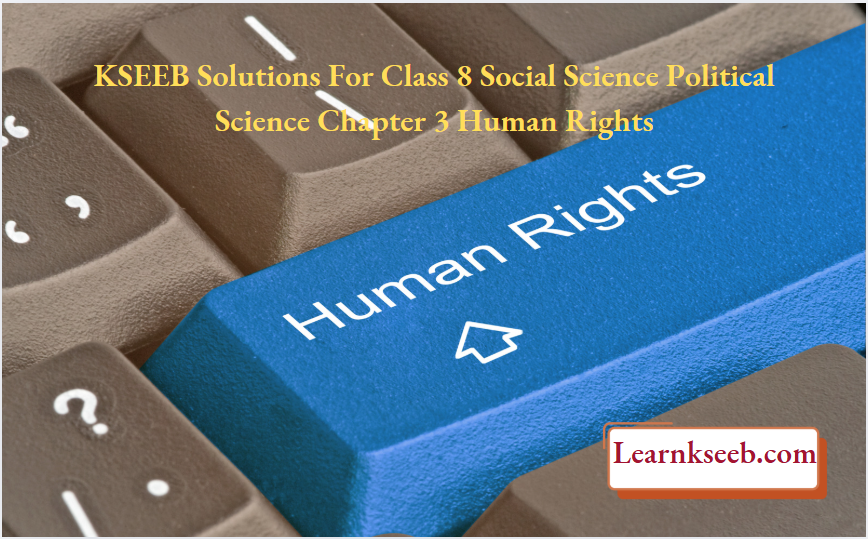KSEEB Solutions Class 8 Political Science Chapter 3 Human Rights Points To Remember
Renowned political thinker H.J. Laski declares that “A nation can be identified through its human rights”. The roots of Human Rights are traced to Athens and Sparta, the two city-states of ancient Greeks. During 1215 C.E., the King John of England broke many ancient rules and traditions. People revolted against the King pressing for their rights. As a result, the King entered into an agreement and signed ‘Magna Carta’.
John Locke presented the first systematic discussion of Human beings’ natural rights. According to him, basic rights cannot be given to any individual. Revolutions took place in America and France due to the influence of John Locke, Rousseau, and Montesquieu.
Read and Learn More KSEEB Solutions for Class 8 Social Science
In order to protect Human Rights and with the efforts of Stalin, Roosevelt, and Churchill, the United Nations Organizations came into existence. The Preamble of UNO declares: “We the people of the world have decided to protect our future generation from the destruction of wars. War has driven us to sadness twice in our lifetime”.
The UNO directed all its member countries to protect Human Rights compulsorily on December 10, 1948. There were seven fundamental rights in the original constitution of India.
Later, by the 44th amendment of the constitution in 1978, the right to property was taken out of the fundamental rights and included under article 300A as the constitutional right.
The UNO held a meeting with all the member states in 1966 and directed all the member states to remain committed to the protection of Human Rights.
National Human Rights Commission was established through legislation in the parliament in 1993. The Chairman and the members are appointed by the President of India.
As per the Human Rights Law 1993, the state human rights commissions are established at state levels. The Chairman and the members are appointed by the governor.
The National Commission for Schedule Caste and Tribes was bifurcated in the year 2003 by 89th amendment to article 338. The National Commission for Schedule Tribes came into existence as per the 89th amendment to the constitution in the year 2003
National Commission for Backward Classes commission was founded in 1993.
Class 8 Political Science Human Rights KSEEB Notes
In order to protect the rights of women, the National Commission for Women was formed under the law in 1990. The National Commission for Minorities was formed in the year 1992 for the protection of minority people.
The Central Government has implemented many laws to protect from exploitation: Minimum Wages Act 1948, Prevention of Unethical activities Act 1956, Prohibition of Dowry Act 1961, Prohibition of bonded labor Act 1976 Sati prevention Act 1987, Human Rights Protection Act 1993, Right to Information Act 2005, Domestic Violence Prevention Act 2005

Kseeb Class 8 Social Science Political Science Chapter 3 Exercise Answers
Human Rights Exercises
Fill in the blanks of the following sentences:
- Human Rights were declared in the year 1948.
- Magna Carta has signed by King John of England.
- At present 6 fundamental rights are there.
- The right to property is a constitutional right.
- The Chairman of the Human Rights Commission is appointed by the President of India.
Human Rights Answer the following after the group discussion:
Question 1. Explain the development of Human Rights.
Answer:
The roots of Human Rights are traced to Athens and Sparta, the two city-states of ancient Greeks.
Plato, Aristotle, and Socrates discussed Human Rights.
Magna Carta or the great agreement which is the base of the English Constitution assured some rights.
John Locke presented the first systematic discussion of Human beings’ natural rights.
The list of Human Rights was declared by America on December 15, 1791.
France declared the Human Rights Declaration in the year 1789.
The League of Nations had a separate directive on Human Rights.
Stalin, Roosevelt, and Churchill established the United Nations Organizations in order to protect Human Rights.
The UNO directed all its member countries to protect Human Rights compulsorily on December 10, 1948.
Kseeb Class 8 Political Science Chapter 3 Summary And Notes
Question 2. Human Rights are essential for the universal development of human beings. Discuss.
Answer:
Human Rights are essential for the peaceful living, co-existence, and development of human beings.
They are the building blocks of democracy.
They enable everyone to lead a life of dignity.
They ensure the development of a better society.
They are essential for every human being to lead a life of dignity.
Question 3. The Supreme Court is the custodian of Fundamental Rights. Discuss.
Answer: Fundamental rights violations are addressed by the Supreme Court and high courts. If anybody tries to denial of Fundamental rights people can approach the supreme court
Question 4. The National Human Rights Commission is the watchdog of human rights. Substantiate.
Answer: The commission has been mandated to function independently without prejudice and interference.
Kseeb Class 8 Political Science Chapter 3 Human Rights Question Answers
Question 5. Which are the Institutions protecting Human Rights?
Answer:
National Human Rights Commission
State Human Rights Commission
National Commission for Schedule Caste
National Commission for Backward Classes
National Commission for Schedule Tribes
National Commission for Women
National Commission for Minorities
Human Rights Additional Questions And Answers
Choose the correct alternative and Write the complete answer along with its alphabet in the sheet provided:
Question 1. The building blocks of democracy are
- Rights
- Duties
- Laws
- Courts
Answer: 1. Rights
Question 2. The king of England who signed the Magna Carta was
- King Joseph
- King George
- King Henry
- King John
Answer: 4. King John
Question 3.The person who presented the first systematic discussion of Human beings
- John Mary
- John Locke
- Abraham Lincoln
- Woodrow Wilson
Answer: 2. John Locke
Class 8 Political Science Chapter 3 Human Rights Kseeb
Question 4. The Bill of Rights was implemented in the year
- 1689
- 1680
- 1670
- 1690
Answer: 1689
Question 5. The countries where revolutions took place due to the influence of John Locke, Rousseau, and Montesquieu are
- India and Pakistan
- England and Germany
- America and France
- Australia and England
Answer: 3. America and France
Question 6. The organization established by Stalin, Roosevelt, and Churchill is the
- World Trade Organizations
- United Nations Organizations
- League Nations Organizations
- World Health Organizations
Answer: 2. United Nations Organizations
Questions 7. World Human Rights day celebrate on
- November 10
- October 10
- January 10
- December 10
Answer: 4. December 10
Kseeb Class 8 Political Science Chapter 3 Important Questions
Question 8. Human rights are protected in the Indian constitution under
- Directive principle of state policy
- Fundamental duties
- Fundamental rights
- Law and order
Answer: 3. Fundamental rights
Question 9. The Chairman and the members of the National Planning Commission are appointed by the
- Prime of India
- President of India
- Vice- President of India
- Governor of the State
Answer: 3. Vice-President of India
Question 10. The Chairman and the members of the State Planning Commission are appointed by the
- Prime of India
- President of India
- Vice- President of India
- Governor of the State
Answer: 4. Governor of the State
Kseeb Solutions Class 8 Political Science Chapter 3 Notes
Fill in the blanks of the following sentences:
- The American Independence was declared in the year 1787.
- The Right which was abolished in India was the Right to Property
- The Commission was established through legislation in the parliament in 1993 as National Human Rights Commission.
- The tenure of the members of the National Planning Commission is for five years or till the attainment of 70 years.
Human Rights Answer the following questions in one or two sentences:
Question 1. What is the declaration of renowned political thinker H.J. Laski?
Answer: Renowned political thinker H.J. Laski declares that “A nation can be identified through its human rights”. Human Rights enable everyone to lead a life of dignity.
Question 2. The UNO has declared Human Rights and has said it is the duty of the state to protect human rights. Why?
Answer: Human rights ensure the development of a better society.
Question 3. What does the Preamble of UNO declare?
Answer: The Preamble of UNO declares: “We the people of the world have decided to protect our future generation from the destruction of wars. War has driven us to sadness twice in our lifetime”.
Kseeb Solutions For Class 8 Political Science Chapter 3 Pdf
Question 4. How does the UNO protect Human Rights?
Answer: In order to protect Human Rights, the UNO, directed all its member countries to protect Human Rights compulsorily on December 10, 1948.
Question 5. Why was National Human Rights Commission established?
Answer: In order to protect Human Rights, the UNO, directed all its member countries to protect Human Rights compulsorily on December 10, 1948.
